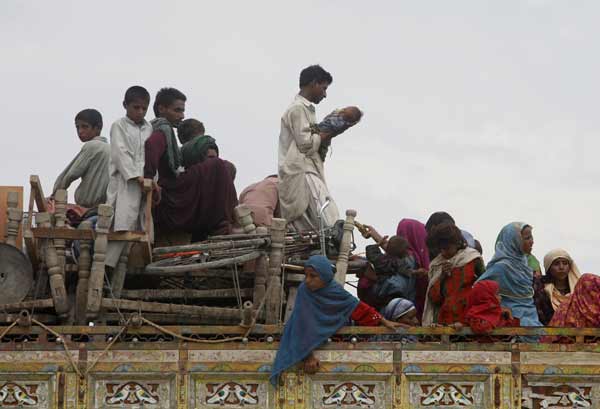Epidemic endangers Pakistan
The life of millions of Pakistan's flood victims are endangered due to the outbreak of epidemic diseases resulted from the worst floods in the country's history.
 |
|
Members of a family fleeing flood waters board a truck while looking for higher grounds in Sukkur in Pakistan's Sindh province August 16, 2010. Pakistan authorities forecast on Monday a brief respite in rains that sparked the country's worst floods in decades, but aid agencies warned help was too slow to arrive for millions without clean water, food and homes. [Xinhua/Reuters Photo] |
At least 29 people were killed due to gastroenteritis disease overnight on Tuesday and 50 others were in critical condition as thousands of affected people were hospitalized across the country, local media reported, citing hospital and official sources.
On Monday, the waterborne gastroenteritis killed 15 people as the epidemic is spreading faster through contaminated flood water, affecting mostly children women and old people.
The United Nations fears 3.5 million children would be affected by various waterborne diseases in Pakistan, while the International Red Cross has indicated a new challenge posing life threat due to the outflow of unexploded explosive material from landmines and other ammunition, particularly in insurgency plagued tribal areas and Kashmir where military operations are in progress.
A spokesman of Pakistani military has said troops have been directed to take preventive measures as the explosive has flown into cities with the floods water.
Over two weeks of heavy rains and floods have so far killed 1, 600 people, displaced 20 million people and destroyed some 900,000 homes across the country, official sources said.
Pakistani Information Minister Qamar Zaman Kaira told a news conference in the capital city on Monday that registration of flood affected people is in progress. The rescue operations would be accomplished by the end of October whereas damage estimation would be done by Nov. 30. The U.N. believes that the rehabilitation and reconstruction would take at least five years.
The United Nations Secretary General Ban Ki-moon who visited Pakistan on Sunday, had appealed to the world to contribute 460 million dollars. The World Bank has pledged 900 million dollars loan to Pakistan.
Pakistan's Health Ministry has sent a red alert to the World Health Organization (WHO) for starting an emergency treatment against the diseases which are spreading faster along the flowing polluted water which is mixing tap and well water with sewerage and other contamination.
It has estimated that some 36,000 people have been affected by the breakout of cholera alone in Pakistan.
The WHO is preparing a contingency plan to assist Pakistan to prevent major outbreak of a wide range of epidemics, according to UNICEF. WHO projects that up to 1.5 million cases of stomach diseases (including up to 140,000 of cholera), 150,000 cases of measles, 350,000 cases of acute respiratory infections, and up to 100,000 cases of malaria can occur over the next three months.
UNICEF said it plans to provide clean water to 6 million people in Pakistan's flood-stricken area as preventive to the challenge posed by the waterborne diseases. The head of water, sanitation and hygiene for UNICEF in Islamabad, Omar El-Hattab, said that assistance has been reaching one million people per day. "But more funds are urgently required in order to reach all those in need," he added.
The U.N., International Red Cross and other relief organizations have noticed the sluggish pace of international aid release, which, according to analysts, was probably due to ineffective usage of funds in some previous disasters such as the October 2005 earthquake in Pakistan.
According to local media reports, despite consistent rescue operations and relief activities, 5 million of the 20 million flood-affected people are still need to be reached properly while the high-level floods would continue to flow with full intensity for the next four days.
 0
0 







Go to Forum >>0 Comments